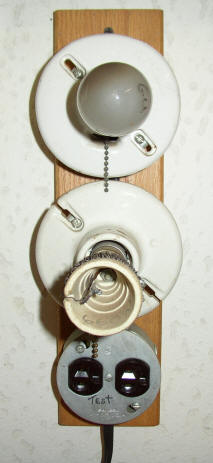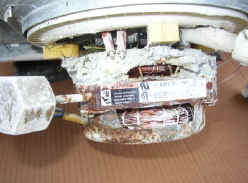The
DRSNews
September/October
2005
By
Subscription Only
© 2005 Dave’s Repair Service, All Rights Reserved
***************************************
In this issue:
1) A Ground Fault Interrupt (GFI) Can Save Your
Dishwasher
- An Old Codger Has a Change of Heart (Sort of)
2) Yet Another Use
(#16?) For that Trusty Old Shop-Vac
- 'Evacuating' Nuisance Bees!
1)
I confess to never being a fan of GFI receptacles.
Like nearly everything else we form opinions about, it goes
back to my upbringing. Please allow me a few lines to
explain.
I grew up (OK, I know, some
of you would argue that point!) spending as much time as possible
in my Dad's motor repair shop, and have never been afraid of
electricity (respect and fear differ <grin>).
One of my earliest memories
of the shop was 'arc-drawing' pictures on Dad's big old bench
vise.
We did this by plugging a
patch cord into his 'test board' and attaching one side of the
120 volts to the vise mounting bolt with one alligator clip, and
drawing pictures with the other.
It was great fun and looked
pretty dramatic to a little kid, with sparks flying all over (not
to mention the cool static it caused on my sister's radio
<g>). I can still smell the ozone that came from this game,
and there wasn't a 'bare' spot on that entire, tortured old vise!
 By the way, one of those test
boards is a very handy tool if you do much electrical testing on
your bench. Just a board with two porcelain pull-chain sockets
and a receptacle attached, hung on the wall above the
bench. Here's mine:
By the way, one of those test
boards is a very handy tool if you do much electrical testing on
your bench. Just a board with two porcelain pull-chain sockets
and a receptacle attached, hung on the wall above the
bench. Here's mine:
The sockets are wired in
series with the 'hot' side of the receptacle, allowing different
sized bulbs and higher wattage 'cone' heaters to be quickly
connected in series with a load under test. I use mine all
the time, and it's extremely handy. Faster than an ohmmeter, and
it loads a circuit heavily when required.
My electrician brother and I
used to see what wattage bulb we could screw into that test board
and still 'hang on' to (He always won - might explain that
twitch...)
Anyway, getting back to GFI's,
when these devices came on the scene, my whole family snickered.
I mean, why would anyone need such high tech protection from just
120 volts? What wimps!
Throughout my career as an
appliance technician, I've dealt with far too many 'nuisance
trips' of GFI's. Especially memorable are those dead food
freezers whose contents spoiled several days before anyone knew
the blasted GFI had tripped off. Those experiences further
'soured' my opinion of this 'unnecessary complication'.
But I say all that to say
this (thank goodness - he DOES have a point!): There's a place
for these devices, and it's in an application I never used to
recommend: connected to an appliance with a motor.
The 'fatal' dishwasher
failure I see most often, at least on the most common vertical
shaft models, is motor failure due to water leaks through the
pump seal, located just above the motor on this
design. Here's one that wasn't caught nearly early
enough to save:

Yikes! Trouble is, the
leak often develops so slowly, by the time it's noticed the
motor's been damaged beyond repair. The secret to preventing this
damage is discovering that slow leak as early as possible.
I've a colleague out West
who's invented a clever little tray to mount under dishwashers. It's
designed to divert any water leaks out the front, where they're
quickly noticed. That's a great idea.
But another 'ounce of
prevention' is to wire the dishwasher to a GFI circuit. This is
done in many newer homes but out here in the boonies I seldom see it.
In the past 6 months, I've
been able to 'save' two really nice dishwashers from the usually
fatal leak, due to GFI's. In the same time period, though, I've
also 'DOA'd' and scrapped 3 or 4 with water-ruined motors
in machines that no one knew had been leaking.
So I've begun recommending
that dishwashers be connected to a GFI circuit whenever possible.
I'm pretty sure that's already required in many parts of the US,
but evidently it's not here in our area yet.
The reason this works so well
is simple. When a failed pump seal allows water to find its way
into the motor windings, the resultant electrical leakage to
ground trips the DW's GFI circuit breaker or GFI receptacle, the
machine goes dead, and I get a call.
After replacing the seal kit,
the machine's back up and running in under an hour, and well
under half the price of a new one.
So maybe I'm getting 'soft'
as I age, but I guess GFI's do have their place. (How about it,
brother? 100 watts, no GFI? [twitch])
2) Way back in the
August/September 2002 issue of this little ramble, we talked about
that most awesome of handy tools, the mighty wet-vac. I
believe we came up with some 15 uses for the critter back then,
plus a few we couldn't mention in such a high-class publication
as this <grin>.
Well, I found another use for
one this summer, and thought I'd pass it along.
We had a really hot and dry summer here, one of the hottest on record. Yellow Jackets, the one species of bee I truly despise,
apparently loved this weather, because they've had a very, very
good year, and it seems they're everywhere.
Anyway, by the time we
noticed the buzzing inside our house wall, their numbers had
grown huge (kind of like a gradual dishwasher seal leak
<grin>).
I tried everything I could
think of to get spray up into that nest, short of tearing the
wall apart, with no success at all. When a friend mentioned that
he watched a local beekeeper use a type of low volume (?) vacuum
cleaner type device to harvest a renegade Honeybee swarm, the
lights went on!
I promptly duct-taped a piece
of downspout to a 2-1/2'' vac hose and drug out one of the many
vacs around here. Plugged it into a timer (through a GFI
<grin>) to come on at daybreak and run for a couple of
hours. After it ran a while and I enjoyed watching the miserable
critters disappear into the hose, I sprayed just a bit of
wasp/hornet spray into the business end with the vac still
running, then shut it down.
Wow! Thousands were
collected that first run. After repeating this little exercise
several times and collecting an estimated thousand or more each run, all
is quiet, and I can recommend this as yet another 'official' use
for old Clyde, the wet-vac, and have added it to the list,
located here.
I know this isn't a permanent
fix for this problem, but until I can seal the hole in the old house
foundation, it'll do nicely. (Update: a few years later I used this
again; this time they were in the garage foundation!)
If you've found any
especially handy and/or unusual uses for your wet-vac, please send
them on in and we'll add them to 'the
list'.
***
As always, if you have any topics you’d like to see discussed
here or covered in an online article, let me know and I’ll
do my best to oblige.
And
don't forget those testimonials! Many thanks if you've
already sent yours in! I'm posting them just as
fast as I can!
God bless,
Dave Harnish
Dave’s Repair Service
drs@sosbbs.com
www.DavesRepair.com
Amos 4:13
© Copyright www.DavesRepair.com All Rights Reserved
Articles may be reprinted and distributed freely only
in their entirety and including this message.